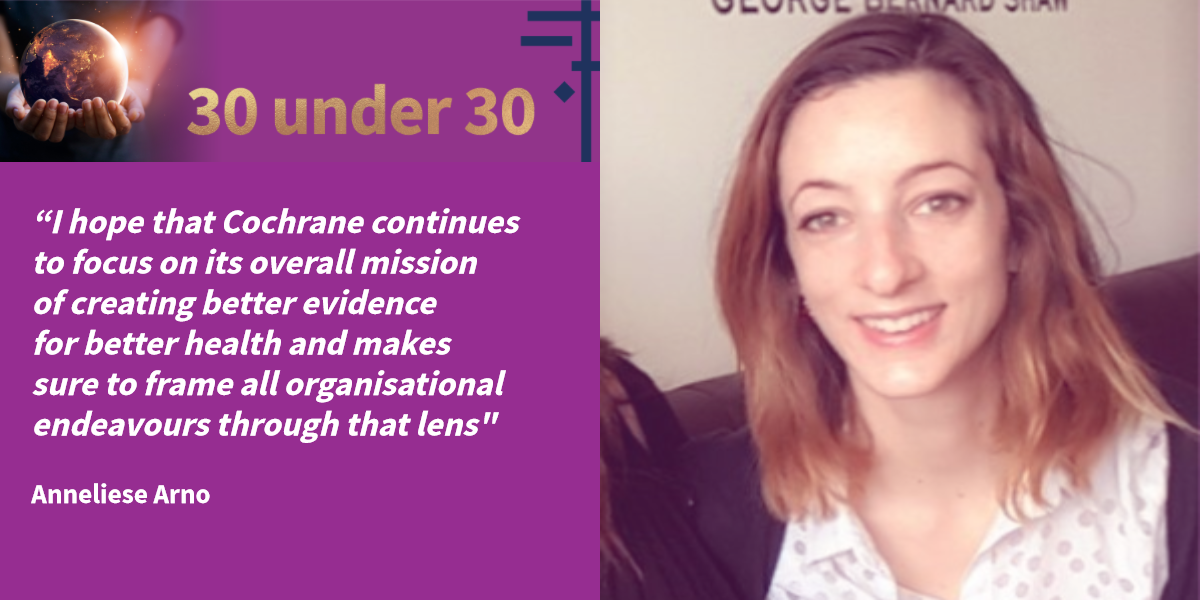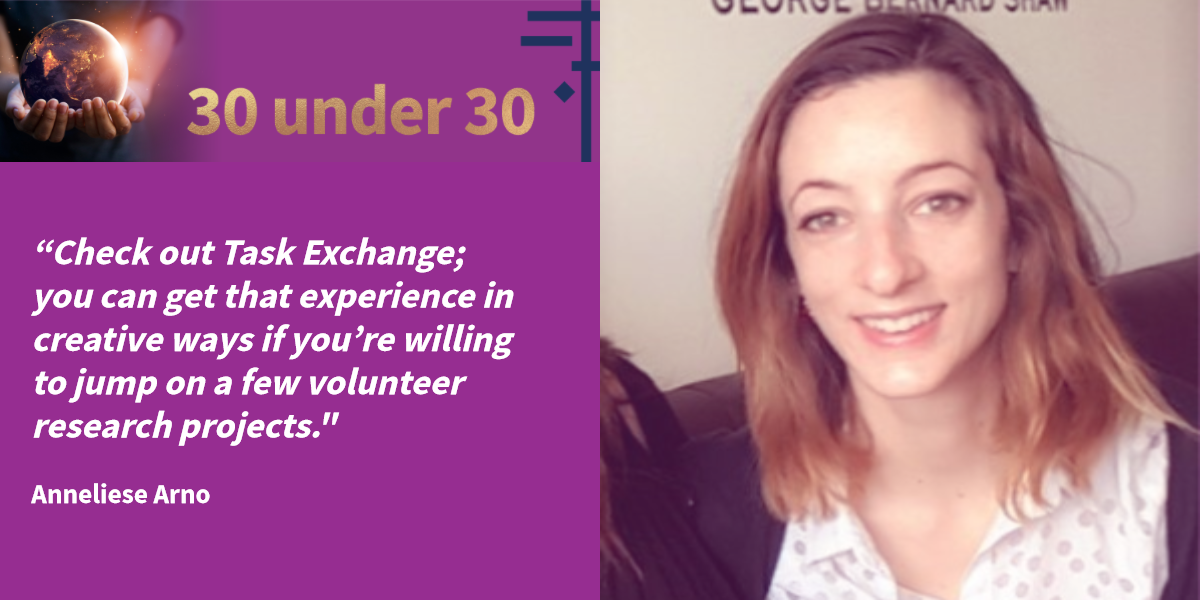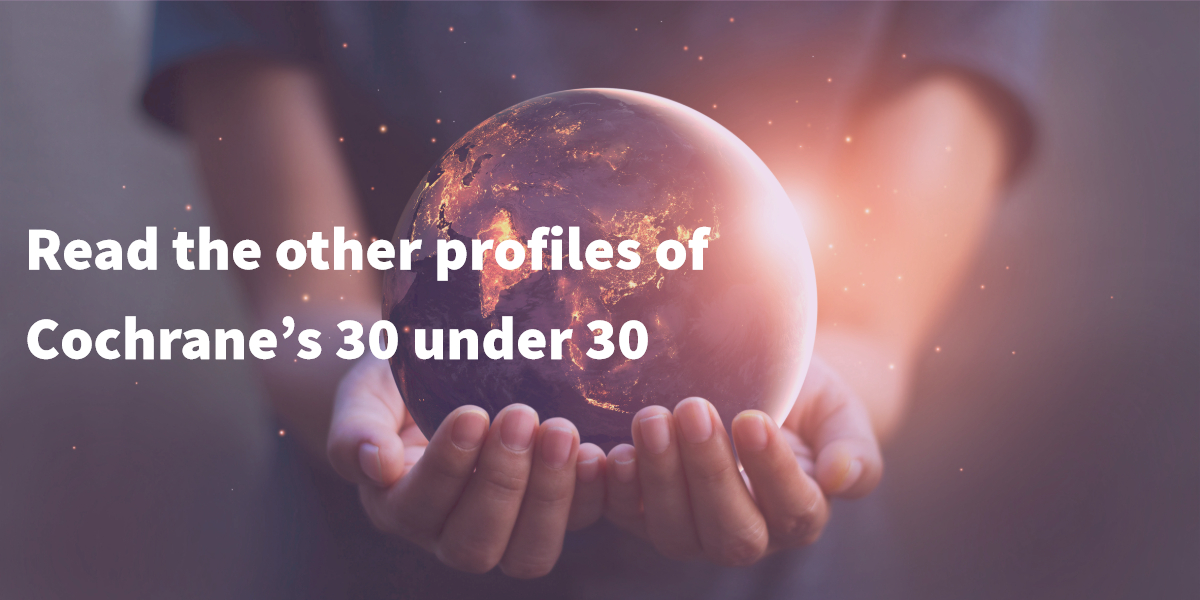
Cochrane is made up of 11,000 members and over 67,000 supporters come from more than 130 countries, worldwide. Our volunteers and contributors are researchers, health professionals, patients, carers, people passionate about improving health outcomes for everyone, everywhere.
Cochrane is an incredible community of people who all play their part in improving health and healthcare globally. We believe that by putting trusted evidence at the heart of health decisions we can achieve a world of improved health for all.
Many of our contributors are young people working with Cochrane as researchers, citizen scientists, medical students, and volunteer language translators and we want to recognize the work of this generation of contributors as part of this series called, Cochrane’s “30 under 30."
In this series, we will interview 30 young people, 30 years old or younger who are contributing to Cochrane activities in a range of ways, all promoting evidence-informed health decision making across the world.
We will be hearing from them in a series of interviewees published over the coming months.
We're keen to hear from you. Would you like to take part in this series? Do you know someone you'd like to see interviewed? Contact lparsonson@cochrane.org. Or if you want to know more about Cochrane’s work contact membership@cochrane.org where our community support team will be happy to answer your questions.

Name: Anneliese Arno
Age: 29
Occupation: PhD/MPhil student, University College London
Program: Community Manager, Covidence.org
How did you first hear about Cochrane?
I first heard about Cochrane through a module in my Masters course in Global Health at Trinity College Dublin.
How did you become involved with Cochrane? What is your background?
I loved the course during my time at Trinity – just loved the whole concept of making better health decisions by drawing on large amounts of data. My MSc thesis ended up being a systematic review – not a Cochrane review, however.
I describe my background as being in Public Health, but really, it’s been a journey. My undergrad degrees were in Biology and Economics, and I figured Public Health would be a good way to combine the two interests. From there I studied Global Health, and then started the job I’m currently in with Covidence after seeing it listed on the Cochrane website. Through working with Covidence and Julian Elliott, I started my PhD researching automation technologies.
What do you do in Cochrane?
I’m not directly associated with Cochrane, but rather with Covidence, the recommended tool for Cochrane reviews. With Covidence, I train users and communicate user needs back into the product development process. With my PhD work, I’m researching the adoption of automation technologies in systematic reviewing.
Through both my PhD and through Covidence, I’ve attended several Cochrane Colloquia and am involved with the Living Systematic Review Network, the Human Behaviour Change Project, and collaborate within Cochrane on my research.
What specifically do you enjoy about working for Cochrane and what have you learnt?
Getting to connect with people all over the world is a huge plus for me – I’ve always wanted travel and exploration to be part of my life, so it’s great to combine that with my work.
In terms of the biggest lessons I’ve learnt: first, to be adaptable. Even the most well-planned projects hit road bumps and have to be continually re-evaluated, and that is okay. I think early career researchers (myself absolutely included) can get very discouraged when this occurs and feel like we’re incapable of the research we’ve undertaken, when the truth is that the whole process is fairly normal. Second, that it’s always worth it to take a moment to ask the bigger questions about the research you’re doing. Keeping your sights on your mission and ‘zooming out’ of what you’re doing helps to make the tougher periods easier to get through.
What are your future plans?
Finishing my PhD! After that, I’m hoping to continue with the same sort of research – how do we maximise efficiency and quality in health research? I’d love to also get back to my Global Health background and contribute to technological capacity building in LMIC settings.
In your personal experience, what one thing could Cochrane do better to improve its global profile?
Cochrane is still very English-speaking world focused, in my observation. There’s been improvements in this, but I think there’s a long way to go!

What do you hope for Cochrane for the future?
I hope that Cochrane continues to focus on its overall mission of creating better evidence for better health and makes sure to frame all organisational endeavours through that lens. Given the following question, I also hope that Cochrane communicates to new graduates that their input is desired and valued.
How important is it that young people get involved in Cochrane? Why is this, do you think?
Extremely! Every organisation can always improve, and new, fresh ideas are often the best way to do that.

What would your message be to other young people who want to get involved with Cochrane’s work but not sure where to start….?
Check out TaskExchange to see if you can get some bits of experience here and there. It can be hard to face the wall of job descriptions requiring seemingly huge amounts of experience, but you can get that experience in creative ways if you’re willing to jump on a few volunteer research projects. Also try to be active in discussion forums like Twitter and LinkedIn – with a bit of regular academia-minded input, people will learn your name and help you with further connections.


